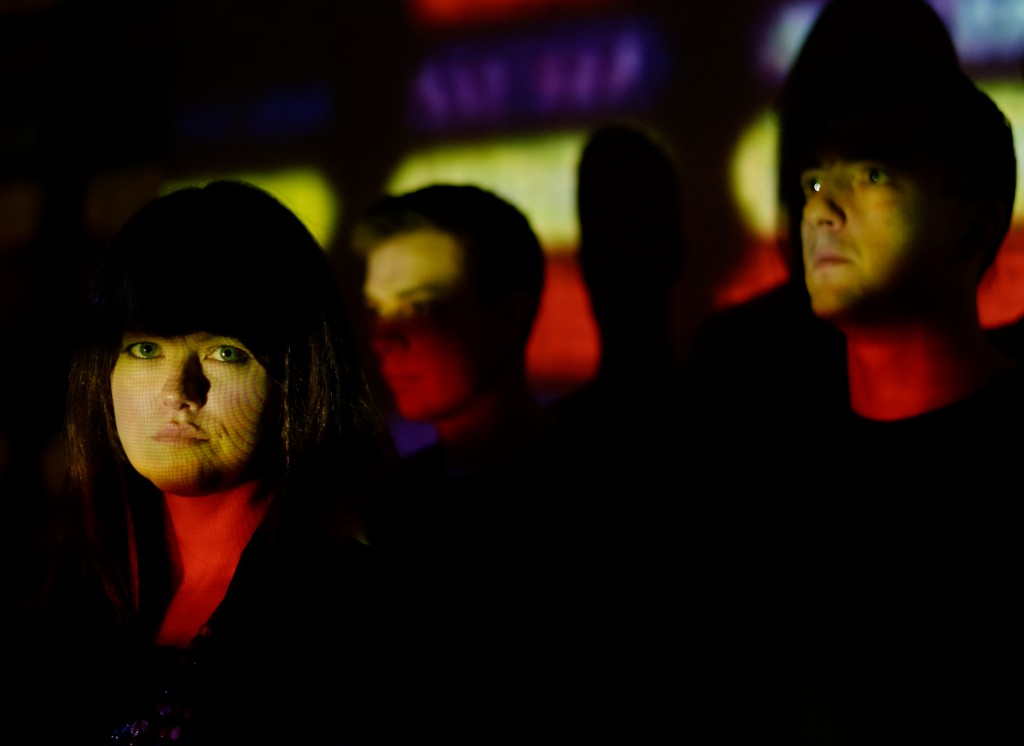

Turn All Memory To White Noise
The new album
Album of the Week
Sunday Times
“A fusion of pastoral pleasures and latterday Portishead”
Q
“Folk roots, but happy on the dancefloor”
Mojo
“Veiled in poetic imagery & polished arrangements…Donelly’s voice radiates some of the sultry melancholia of Lana Del Ray”
Uncut
“Majestic, intimate, spine-tingling and heart stopping”
Alt Sounds
“a brilliant fusion of technology, nature and emotion”
Louder than War
“Beautiful voice, beautiful lyrics, beautiful band”
seesound.co.uk
“These three have a big year ahead of them”
The 405
“The pulse of electronica, the space of classical soundtrack work is beautifully realised by laki mera in the new album’ music”
news.com
“gorgeous vocal over the top of careful combinations of electronic sounds”
The Line Of Best Fit
From the top floor of the old Templeton Carpet Factory – overlooking Glasgow Green and The People’s Palace, designed with muscular 19th century industrial ambition to look like the Doge’s Palace in Venice – Laki Mera had a great view of their future.
In the studio space they’d christened Carrier Waves, the Glasgow band were working on their second album, ‘Turn All Memory To White Noise’: the majestic, intimate, spine-tingling and heart-stopping follow up to The Proximity Effect. As they worked on an album that artfully fuses electronics, strings, found sounds, ear-worm melodies and Laura Donnelly’s bewitching voice, the praise for their 2011 debut rang in their ears…
“Wonderful debut album… creat[ing] a dense folktronic architecture with an intricacy and subtlety that recalls the Blue Nile, Cocteau Twins and Portishead…”
The Sunday Times
“One of the most promising intelligent pop acts Scotland has produced this decade”
The Daily Record
“This is how it should be done… the most confident debut I’ve heard in a long while. It has the calm authority of musicians who know exactly what they want to do, are prepared to work stupid hours to realise and perfect it”
Drowned in Sound
“Epic”
The Sun
…but Laki Mera are not a band to rest on their laurels. They’ve come too far, done too much, experienced too much, to go with the flow of critical approval. Producer and multi-instrumentalist Andrea Gobbi – aside from his “day-job” in Laki Mera, he’s firmly plugged into the Scottish music scene as a producer, and mixing and mastering engineer, over two decades after relocating from Italy – admits that they had firm ideas from the outset for the band’s second album.
“The first album was us focusing on trying to record songs that we’d composed and written while performing live as a band,” he reflects. “Whereas this record was entirely a studio album. We really sat down and wrote and recorded and focused on composing the tracks.”
Starting in autumn 2011, Gobbi, singer/lyricist/multi-instrumentalist Donnelly and Keir Long (piano/synths) devoted themselves to the album – for an entire year.
“The fact that we’ve written it, composed it, scored the strings and the brass, and recorded it all in such a concentrated period of time, is what’s made it such an honest record,” continues Gobbi, “from the point of view of the stage we’re going through as a band. It was us getting into the studio for a year and exploring what we were about.”
In keeping with the directness and candour of the new songs (see opening track Come Alone, a harsh, percussive curtain-raiser), Gobbi sanguinely admits that the band’s new outlook was born of some upheaval.
Firstly, drummer Tim Harbinson left the band just as they were beginning to work on the new album – not before, however, contributing to the creation of ‘Winter (There’s A Light)’. A frost-glistening meld of acoustic guitars and cardiac synths, it’s the only “old” song on ‘Turn All Memory To White Noise’, in that Laki Mera played it live on their last tour.
But as Gobbi says, this realigning of the band simply focused them back on their roots. Laki Mera were born out of the individual musical relationships he had with Long recording scores for films, and with Donnelly making electronic productions. Reconfiguring as a trio simply amplifies those core duos and lets Laki Mera return to and build on their founding principle.
This twin-track dynamism – the pulse of electronica, the space of classical soundtrack work – is brilliantly realised in a pair of songs at the heart of the album, the spare, minimal Séraphine and All I Have, a glitchy, dancefloor-friendly epic that is earmarked as the album’s second single – a perfect summer club tune. The juxtaposition of the two, nods Gobbi, was purposeful.
“Séraphine was always a more organic, acoustic-feeling track. It does have Chinese guzheng melodies, which is a dulcimer-like instrument. It was all very played and organic – we had a guest double-bass player too. Then we go straight into a much more uptempo moment. That was a deliberate choice.”
Laki Mera’s grasp of the dynamics of electronica is also evident on first single Sweet Warm Dance. It combines Moog, as well as a PPG, “a special German synth from the Eighties that we managed to get hold of”, to atmospheric affect. Red Eyes, meanwhile, deftly marries the natural with the synthesised – it bristles with the sound of wooden rattles and speaker cones ripping, which the trio sampled, processed and turned into bespoke beats.
And then, secondly, there was the other upheaval Laki Mera had to process. The beginning of the album also marked the end of Gobbi and Donnelly’s nine-year relationship. For sure there are references to the split in Donnelly’s new lyrics. But for reasons both personal and artistic, the band prefer to let listeners draw their own conclusions as to which of the songs relate directly to their emotional trials.
Still, how does Gobbi feel when he hears lines such as “I could never be without you” on the airily emotive Red Streak – Cut Sky?
“Sometimes it feels hard,” he admits, adding that with some of the lyrics he’s as much in the dark as the rest of us. “As a producer for other artists, I do tend to relate to lyrics and vocals as an instrument – what melody they play, whether they’re in tune or not… But with this record it is particularly hard not to relate some of them to myself and the history between me and Laura.
“But it’s also very good to look within yourself and, after a year of being split, being able to appreciate the feelings that might have been within her… So listening back and having the milestone of the album written, and having it sound to me the same way forever – I see positively that it’s a useful thing that’s there, to remind me of certain things.”
“At the same time, though,” Gobbi adds, “the way Laura writes lyrics, anybody can get what they want from them, and relate them to their own experience. I guess I’ve been left to do that as well, same as everybody else!” he concludes with a smile.
The album’s title, however, he can explain. Laki Mera are keen readers, and their interest in literature – as well as art and visuals – can’t help but bleed into their music. So during the making of ‘The Proximity Effect’, Gobbi was influenced by Haruki Murakami’s Hard-Boiled Wonderland and the End of the World. While working on ‘Turn All Memory To White Noise’ his key literary touchstone was Margaret Atwood’s Oryx and Crake, “a pseudo-futuristic book which I found amazingly inspiring. I followed the life of the main character a lot and read it over and over. There’s one particular moment, a tragic moment in the book, where he’s left on his own and he’s drunk himself silly… and he can’t cope with reality, so he turns ‘all memory to white noise’ – like he’s turning it all into static, so he can forget about it all for a while, then face reality afterwards when he wakes up.”
Keen to use that line from the book as the album title, the band wrote to the Canadian author seeking permission. Word came back that she wasn’t adverse to the idea – but could she read their lyrics first?
“That was actually great,” beams a still-chuffed Gobbi, pointing out that all the lyrics will be included in an eight-page booklet. “She read through them all and said she was very happy for us to use to that quote. We were really delighted that she took that trouble.”
Atwood, it seems, recognised a band who don’t do things by half, or for effect. Who live their lives through their music. Who put their music in their lives. This is ‘Turn All Memory To White Noise’: human songs built from the pulse of technology, the resonance of nature and the throb of emotion. It’s what sets Laki Mera apart, and above.
Follow Laki Mera:
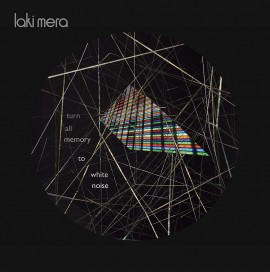
“A fusion of pastoral pleasures and latter-day Portishead“– Q
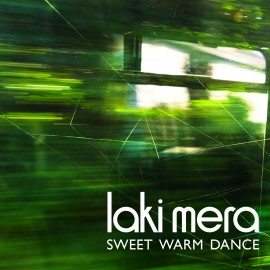
The first single from second album, “Turn All Memory To White Noise” the majestic, intimate, spine-tingling and heart-stopping follow up to The Proximity Effect.
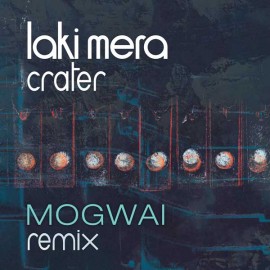
One of the highlights of the debut The Proximity Effect – Crater – has been given a reworking by Mogwai
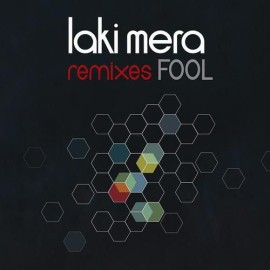
Electro and Progressive House remixes from remix luminaries Bangatang, Sezer Uysal and Ad Brown.
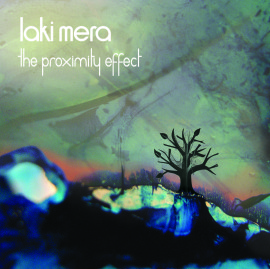
“Wonderful debut album … already being compared to Cocteau Twins & the Blue Nile, but Laki Mera can confound those expectations” – The Sunday Times
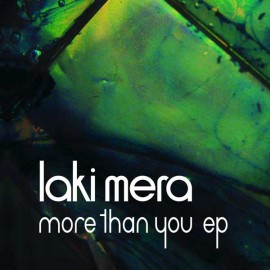
A tantalising insight into the band’s debut full length, The Proximity Effect; from the pristine electronic pop of ‘More Than You’, to the sultry, atmospheric ‘Crater’, to glorious instrumental ‘Pollok Park’.
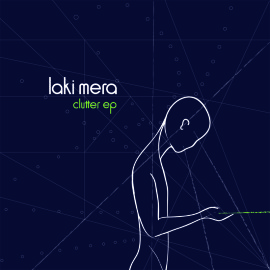
” Just as you end a trip to the fairground both vaguely shaken and exhilarated, Clutter is a whirlwind listen that leaves you wanting more.
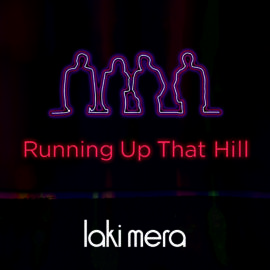
Laki Mera are back from hiatus with a gorgeously silky cover of Kate Bush’s ‘Running Up That Hill’.